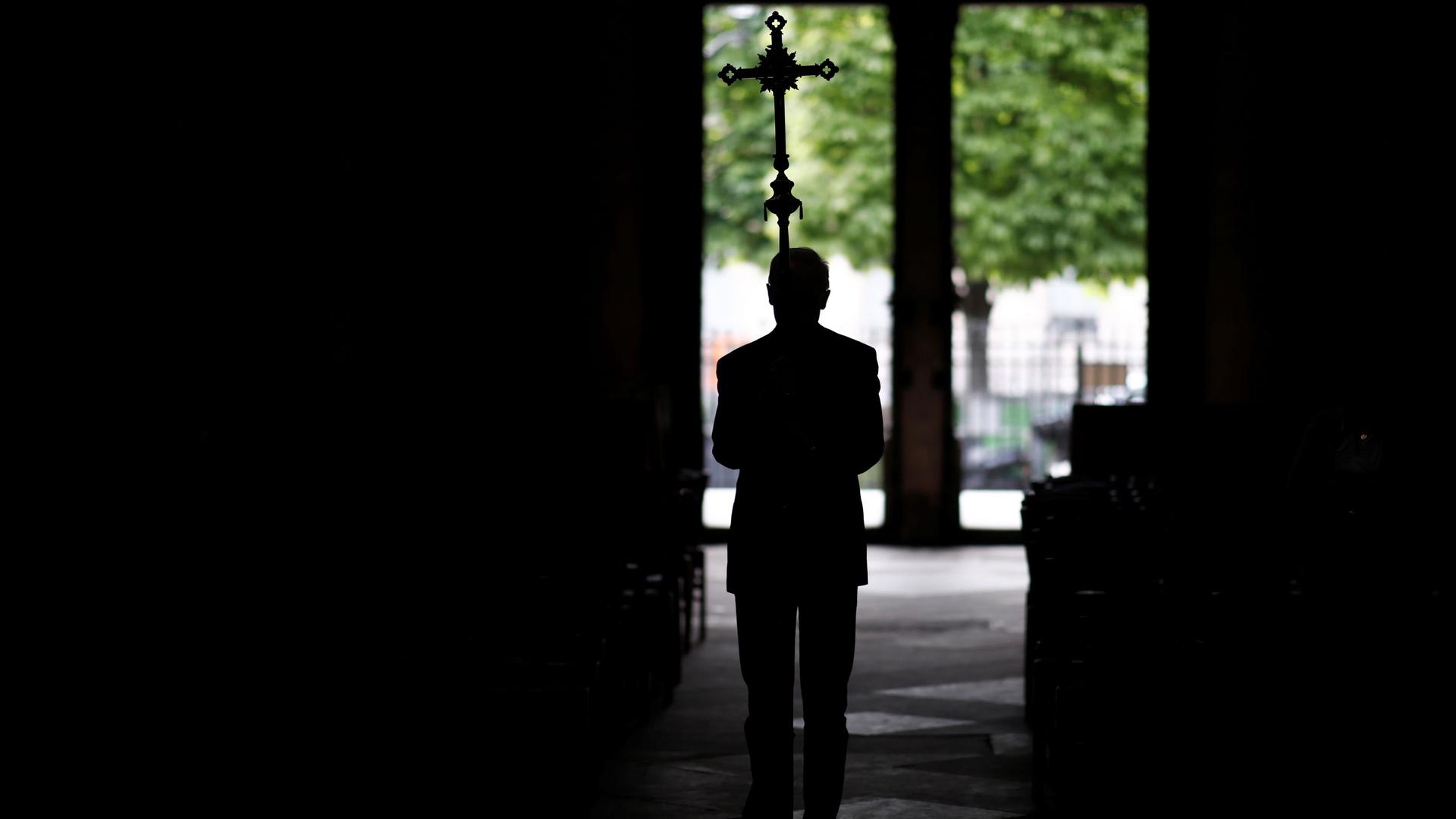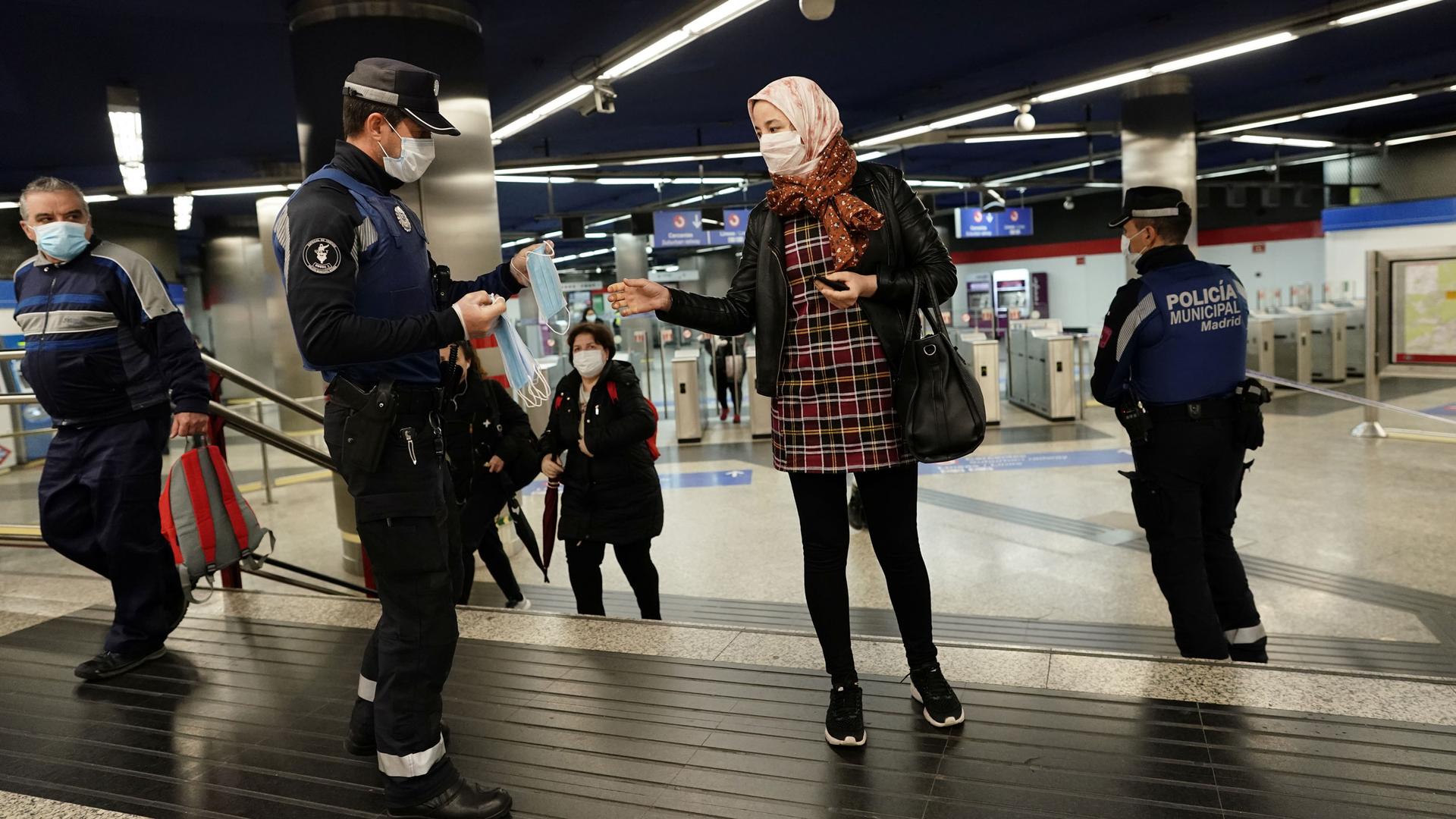Coronavirus restrictions start to loosen in Europe; Oil-producing nations agree to 10% cut in output; Trump’s coronavirus promises largely unfulfilled
A municipal police officer gives out free protective face masks at a metro station during the lockdown amid the coronavirus outbreak in Madrid, Spain, April 13, 2020.
Top of The World — our morning news round up written by editors at The World. Subscribe here.
The death toll and rate of new infections are starting to drop in Spain, one of the countries hardest hit by the coronavirus. While most Spaniards remain in lockdown, the country is beginning to loosen some restrictions, including allowing manufacturing and construction businesses to resume work.
Denmark is also starting to open up. Germany, a leader in coronavirus testing, is working to conduct large-scale antibody testing to help researchers assess infection rates and immunity. And Apple and Google are working to bring contact tracing to their smartphone platforms.
Africans and Black Americans in the Chinese city of Guangzhou are facing racist mistreatment, including eviction and compulsory quarantine, due to coronavirus fears. African officials have condemned the racism in speaking to Chinese authorities.
Also: COVID-19 revives grim history of medical experimentation in Africa
Oil-producing nations agree to 10% cut in output
With a push from US President Donald Trump, oil-rich nations have agreed to cut oil production by nearly 10 million barrels per day in May and June — a drop of nearly 10% that stakeholders hope will stabilize oil prices and global financial markets. The pandemic has drastically reduced demand for oil as global travel has come to a near standstill, causing oil prices to plummet. The agreement, reached on Sunday, is unprecedented in scale and coordination.
And: 5 lessons from World War II for the coronavirus response
Trump’s coronavirus promises largely unfulfilled
One month after Trump declared a national emergency and made sweeping promises of public-private partnerships to address the pandemic in the US, those promises remain largely unfulfilled. Still, Trump hopes to open the economy soon, despite objections from governors and public health experts. The president has also raised speculation he might remove Anthony Fauci after the top infectious disease expert suggested earlier action “could have saved lives.”
Faith leaders consider modifying tradition with technology
The pope, the Vatican — a tiny city-state surrounded by Rome — and the Catholic church in predominantly Catholic Italy have all been forced to modify centuries of tradition because of the coronavirus outbreak. Theologians and scholars of Christianity are observing how this difficult historical moment is fostering a revolution comparable to that which occurred in the 13th century.
And for rabbis trying to connect the faithful, lockdown creates Catch-22s. Some rabbis think videoconferencing technology such as Zoom is a good platform for bridging the gap during the pandemic. Others make the opposite case.
Also: Mexico City’s Passion play usually draws thousands. This year, attendance was virtual.
And: Pope Francis says it might be ‘time to consider a universal basic wage’ in Easter letter
Mourning in the midst of a pandemic
The coronavirus has fundamentally changed how we live our lives, but perhaps most heartbreakingly, how we deal with death. Around the world, centuries-old burial rituals are being stopped. Gatherings to mourn deaths are limited. Even something as simple as a hug for a grieving friend is now essentially out of bounds. Hear how some families are honoring their loved ones and funeral traditions in the midst of the coronavirus.
And: Buddhist nun recommends calming the mind to cope with pandemic
Also: Wajahat Ali on maintaining one’s faith through crises
Music to soothe the soul: Ludovico Einaudi’s ‘Elegy for the Arctic’
Composer and Italian classical piano superstar Ludovico Einaudi teamed up with Greenpeace for a concert in the Arctic Circle in support of a campaign for a marine sanctuary in the North Pole’s international waters and to raise awareness about melting glaciers and rising sea levels.
Einaudi performed “Elegy for the Arctic,” his own composition, on a floating platform in the Arctic Ocean in front of the Wahlenbergbreen glacier in Svalbard, an archipelago in Norway.
Morning meme
A periodic reminder to maintain at least six feet of social distance — and if you’re “born to run,” research suggests keeping more than five Springsteens apart while you hit the track.
In case you missed it
Listen: Faith in the time of a global coronavirus crisis

The coronavirus has fundamentally changed how we live our lives — but perhaps most heartbreaking is how it’s changed how we deal with death. And, every year, thousands of Catholic worshipers travel to the east side of Mexico City to watch a live reenactment of the stations of the cross. This year, as Mexico and much of the world is implementing social isolation measures to slow the spread of the coronavirus, local authorities have decided to cancel the much-anticipated event. Also, why do pandemics happen? That’s a question religious thinkers have been trying to answer for a long, long time.
Don’t forget to subscribe to The World’s Latest Edition podcast using your favorite podcast player: RadioPublic, Apple Podcasts, Stitcher, Soundcloud, RSS.
